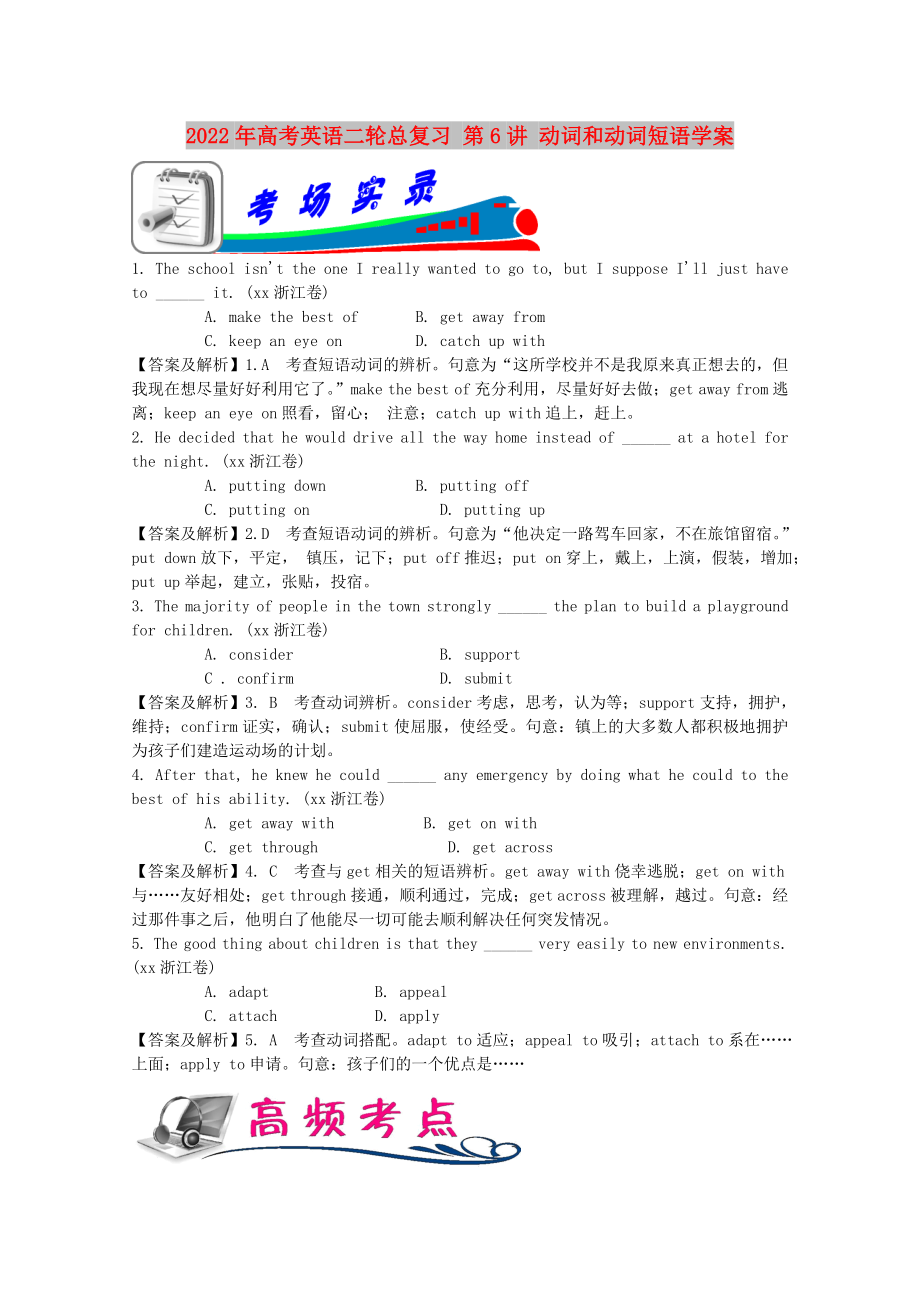《2022年高考英語二輪總復(fù)習(xí) 第6講 動(dòng)詞和動(dòng)詞短語學(xué)案》由會(huì)員分享�,可在線閱讀,更多相關(guān)《2022年高考英語二輪總復(fù)習(xí) 第6講 動(dòng)詞和動(dòng)詞短語學(xué)案(3頁珍藏版)》請?jiān)谘b配圖網(wǎng)上搜索�。
1、2022年高考英語二輪總復(fù)習(xí) 第6講 動(dòng)詞和動(dòng)詞短語學(xué)案
1. The school isn't the one I really wanted to go to, but I suppose I'll just have to ______ it. (xx浙江卷)
A. make the best of B. get away from
C. keep an eye on D. catch up with
【答案及解析】1. A 考查短語動(dòng)詞的辨析�����。句意為“這所學(xué)校并不是我原來真正想去的�����,但我現(xiàn)在想盡量好好利用它
2����、了?����!眒ake the best of充分利用�,盡量好好去做;get away from逃離���;keep an eye on照看����,留心; 注意���;catch up with追上���,趕上。
2. He decided that he would drive all the way home instead of ______ at a hotel for the night. (xx浙江卷)
A. putting down B. putting off
C. putting on D. putting up
3�����、
【答案及解析】2. D 考查短語動(dòng)詞的辨析����。句意為“他決定一路駕車回家���,不在旅館留宿�?����!眕ut down放下�,平定����, 鎮(zhèn)壓���,記下����;put off推遲��;put on穿上��,戴上�,上演,假裝���,增加���;put up舉起,建立�����,張貼�����,投宿。
3. The majority of people in the town strongly ______ the plan to build a playground for children. (xx浙江卷)
A. consider B. support
C . confirm
4��、 D. submit
【答案及解析】3. B 考查動(dòng)詞辨析����。consider考慮,思考���,認(rèn)為等�;support支持�,擁護(hù),維持����;confirm證實(shí)��,確認(rèn)�����;submit使屈服����,使經(jīng)受���。句意:鎮(zhèn)上的大多數(shù)人都積極地?fù)碜o(hù)為孩子們建造運(yùn)動(dòng)場的計(jì)劃。
4. After that, he knew he could ______ any emergency by doing what he could to the best of his ability. (xx浙江卷)
A. get away with B. get on wi
5�、th
C. get through D. get across
【答案及解析】4. C 考查與get相關(guān)的短語辨析。get away with僥幸逃脫��;get on with與……友好相處���;get through接通���,順利通過,完成�����;get across被理解��,越過����。句意:經(jīng)過那件事之后,他明白了他能盡一切可能去順利解決任何突發(fā)情況。
5. The good thing about children is that they ______ very easily to new environments. (xx浙江卷)
6�����、 A. adapt B. appeal
C. attach D. apply
【答案及解析】5. A 考查動(dòng)詞搭配�����。adapt to適應(yīng)�����;appeal to吸引�����;attach to系在……上面��;apply to申請����。句意:孩子們的一個(gè)優(yōu)點(diǎn)是……
動(dòng)詞的辨析
動(dòng)詞是高考考查的重點(diǎn),無論是單項(xiàng)填空����、完形填空還是短文改錯(cuò)題型中����,動(dòng)詞辨析的比重都很大��,并有逐年增加的趨勢���。動(dòng)詞辨析主要指:
1.詞形相近的動(dòng)詞之間的辨析。如:lie, lay; hanged, hung; rise, raise; sit, seat等����。
2.意
7、義相近的動(dòng)詞之間的辨析����。如:borrow, lend; speak, say, talk; hope, wish等。
3.動(dòng)詞與其他詞形相近�、意義相似的詞的辨析。如:advise, advice; cost, worth; pass, past 等�����。
4.意義不同但容易混淆的動(dòng)詞的辨析����。如:explain, say; discover, invent; uncover, find等。
5.某些常用動(dòng)詞的習(xí)慣用法的辨析。如:ask, give, call, make, get, keep, want, see, hear等�����。
6.某些常用動(dòng)詞短語的辨析���。如:give in, give u
8���、p; turn on, turn off, turn down, turn up等。
動(dòng)詞短語的要點(diǎn)
動(dòng)詞短語是指動(dòng)詞和介詞�、副詞或名詞的習(xí)慣搭配。需掌握以下要點(diǎn):
1.根據(jù)動(dòng)詞短語的不同特點(diǎn)�����,掌握其運(yùn)用規(guī)律�。
(1)動(dòng)詞+副詞(不及物)
Harry turned_up after the party when everyone had left.
哈里在晚會(huì)后人們都已離去時(shí)才出現(xiàn)。
(2)動(dòng)詞+副詞(及物)
Please turn every light in the house off.
請把房子里的每一盞燈都關(guān)掉����。
注意:①如果賓語較長,就應(yīng)避免把副詞同動(dòng)詞分開
9��、���。如:
She turned_off all the lights which had been left on.
她關(guān)掉了所有還在亮著的燈��。
②如果賓語是人稱代詞�����,只能放在動(dòng)詞和副詞之間�����。如:She gave them away.
她把它們送人了�。
(3)動(dòng)詞+介詞(及物)
I'm looking_for my glasses.
我在找我的眼鏡���。
注意:①當(dāng)它跟賓語時(shí)�,不能把介詞放在賓語后面���。
②動(dòng)詞短語可以放在句子或從句末尾���。如:
She's got more work than she can cope_with.
她的工作多得使她應(yīng)付不了
10、��。
(4)動(dòng)詞+副詞+介詞
I look_forward_to seeing you soon.
我盼望不久就能見到你�����。
注意:“動(dòng)詞+介詞”���、“動(dòng)詞+名詞+副詞”��、“動(dòng)詞+副詞+介詞”��,這三種搭配都是及物的���,如變成被動(dòng)語態(tài),不可漏掉介詞����。如:
In this way both grain and vegetable can be well looked after. (不能漏掉after)
這樣一來,糧食和蔬菜都能兼顧了�����。
2.熟悉同一動(dòng)詞和不同介詞或副詞�、不同動(dòng)詞和同一介詞或同一副詞搭配在意義上的差異。
(1)同一動(dòng)詞和不同介詞搭配時(shí)���,意義上的差異����。如:
①h
11、ear from收到……的來信����,hear of聽說��。
②look after照料��,look at看����,look for尋找。
(2)同一動(dòng)詞和不同副詞搭配時(shí)����,意義上的差異。如:
①ring back回電話 ring off掛斷電話
ring up打電話
②put away放好����,收起 put on穿上,上演
put up掛起�����,舉起
(3)不同動(dòng)詞和同一介詞搭配時(shí),在意義上的差異����。如:
look for尋找 ask for請求
wait for等候 send for派人去叫
(4)不同動(dòng)詞和同一副詞搭配時(shí),在意義上的差異��。如:
①break out發(fā)生���,爆發(fā)
12��、 carry out進(jìn)行����,開展
go out熄滅 hand out分發(fā)
let out放出 look out當(dāng)心
sell out賣完 set out出發(fā)
take out取出 work out算出
②break down壞了 e down落下來
get down下車 take down取下
write down寫下
易錯(cuò)易混點(diǎn)
1. lay(放), lie(躺)與lie(說謊):這三個(gè)易混動(dòng)詞構(gòu)成見下表:
2. rise和raise:rise是不及物動(dòng)詞�����,其過去式是rose����,過去分詞是risen,而raise是及物動(dòng)詞��,是規(guī)則動(dòng)詞�。
13�����、 3. hang的用法:hang有兩個(gè)意思:一為“懸掛”���,是不規(guī)則動(dòng)詞,過去式�����、過去分詞都是hung��;二為“絞刑”�����,是規(guī)則動(dòng)詞���,其過去式、過去分詞都是hanged����。
4.sit與seat:seat為及物動(dòng)詞時(shí)是作“容納”講,sit只是表示一動(dòng)作�����。seat表示“就座”時(shí)要用be seated 或用seat oneself。如:They were seated at their desks.或I seated myself in the armchair.
5. win與beat:win作“勝��、贏”講時(shí)其后應(yīng)接a game, an argument, a battle, a prize, a contest, a race, a bet等����,但不能接人,如果接人則有另外的含義�。如:I have won him. 即我已說服他了,我贏得了他的好感�。而beat是及物動(dòng)詞,意為“擊敗��、勝過”����,直接接人、隊(duì)��。
6. lost, gone與missing:作補(bǔ)足語時(shí)意為“丟失���、不見了”��,可以用lost, gone���,但要用 miss時(shí)則不能用missed, 而要用missing��。
 2022年高考英語二輪總復(fù)習(xí) 第6講 動(dòng)詞和動(dòng)詞短語學(xué)案
2022年高考英語二輪總復(fù)習(xí) 第6講 動(dòng)詞和動(dòng)詞短語學(xué)案

